#lucile desmoulins
Text
[After the arrest of Danton and Desmoulins] Lucile ran to Madame Danton to suggest that she come with her to go find Robespierre, ask him for an explanation, and recall the feelings of friendship which had attached him to their husbands. Madame Danton refused, saying that she wanted nothing from a man who had showed himself to be the enemy of her husband. (I obtained this particularity from Madame Danton herself, who was then pregnant. She gave birth fifteen days after Danton's death, but her child did not live.)
Histoire de la Révolution française (1850) by Nicolas Villiaumé, volume 4, page 55. This ties in well with the following anecdote that was first reported by Marcellin Matton (who presumably obtained it from Lucile’s mother Annette Duplessis) in his republished edition of Le Vieux Cordelier (1834):
Camille, the day after his arrest, wrote a letter to his wife to console her. One of Camille’s friends took it to Lucile: she read it while sobbing, and as he tried to console her: “It's useless,” she said, “I cry like a woman, because Camille. suffers, because without doubt they let him lack everything; because he does not see us.... But I will have the courage of a man, I will save him.... What to do? which of his judges must I supplicate? Which one should I attack openly? Would you like to take me to Philippeaux?”
”He has also been arrested, no doubt.”
”So the homeland no longer has defenders.... I am going to see Danton....”
”The same decree unites him to your husband.”
”Why have they left me free? Do they think that since I’m only a woman I won’t dare to raise my voice? Have they counted on my silence? I’m going to the Jacobins… I’m going to Robespierre’s house…”
Madame Duplessis and Camille's friend restrained her and urged her not to take any inconsiderate steps that could lose her and her husband as well; finally she agreed to remain quiet; but she wanted to write to Robespierre to ask him to save her husband, the letter remained unfinished and was never sent.
#lucile desmoulins#louise sebastienne danton#georges danton#camille desmoulins#robespierre#maximilien robespierre#frev#french revolution#danton did have sex with a 17 year old then… that’s gross#but poor louise#first she has to deal with her husband’s demise and then she gives birth for the first time ever just two weeks later#only to have the baby die as well
17 notes
·
View notes
Text

#robespierre#saint just#frev#maximilien robespierre#saintspierre#french revolution#maximillian robespierre#antoine saint just#louis antoine de saint just#camille desmoulins#lucile desmoulins#frev shitposting#frev memes#gay memes
205 notes
·
View notes
Text
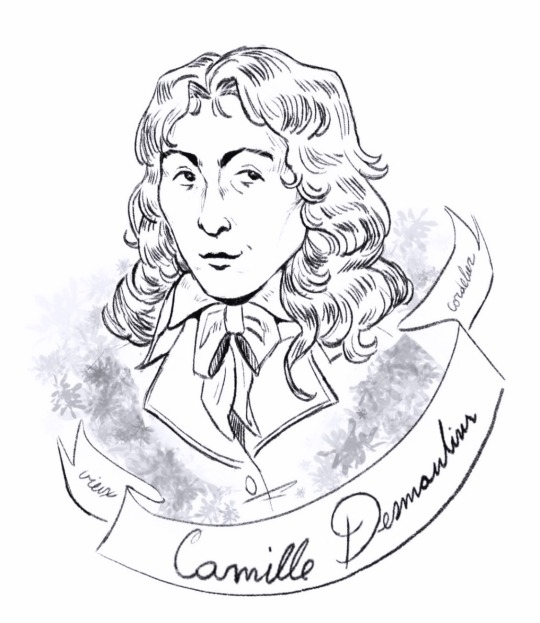
What a talented young man. Surely nothing bad happens to him
#camille desmoulins#Desmoulins#vieux cordelier#lucile desmoulins#maximilien robespierre#robespierre#frev#antoine saint just#saint just#french revolution#frev art#my art
149 notes
·
View notes
Text
A brief history of Camille Desmoulins
It's March 2nd today, which means it's the birthday of my biggest writing muse: Camille Desmoulins, 18th-century journalist, French revolutionary and the man who called the Parisian people to arms, resulting in the Storming of the Bastille.
Despite essentially causing such a major historical event, Camille is largely glossed over by historians, and not many people know about him as a result. However, that doesn't mean he didn't have any influence on the revolution, and he contributed to it the same way as famous personalities like Robespierre, Danton, and Saint-Just did. So, in honor of his 264th birthday, here's a little history of the man gracing my profile pic.

The early years
Camille was born in 1760, in the commune of Guise in the province of Picardy. At fourteen years of age, he obtained a scholarship to study at the Collège Louis-le-Grand in Paris, one of the most esteemed elite schools in France. There, he met Maximilien de Robespierre, and despite the boys being two years apart in age and having very different personalities - Maximilien was more calm and secluded, while Camille was lively and impulsive - the two bonded over their mutual love for classical history and philosophy.
After graduating from Louis-le-Grand, Camille began to pursue a career in law, being admitted to the Parlement of Paris in 1785. However, his stammer and lack of connections to the Parisian legal community impeded his success, so he instead took up writing as a journalist, with a primary focus on political affairs.
The Estates-General and the call to arms
When King Louis XVI convened the Estates-General in 1789, Camille was present at the procession on May 5th, writing a comment about the event. The Comte de Mirabeau, presenting himself as a middleman between the aristocracy and the Third Estate as well as a patron for Camille, even employed the latter as a writer for his newspaper for a time.
However, the mingling of the three estates was not well received by the king, and he tried to regain control over the members who had dubbed themselves the National Assembly by closing the Salle des Menus Plaisirs where the deputies met to them. Instead, the National Assembly held their meeting in the Jeu de Paume (which was normally used as the tennis court of Versailles), where the members from various estates swore the oath to not part until they had devised a new constitution for France.
Eventually, the king was forced to relent, but that didn't keep him from concentrating his troops in Versailles and Paris. When he dismissed finance minister Jacques Necker - who was very popular among the people and considered an advocate for their interests - the atmosphere in Paris took a turn for the worse.
The Parisians were angry, worried, and in fear, and in this situation - on July 12th, 1789 - Camille took the opportunity to leap onto a table in front of the Cafe de Foy in the Palais Royal. There, he delivered a passionate speech, even losing his usual stammer in the heat of the moment, calling the people to take up arms to defend themselves against the imminent massacre of the king's troops* and put on cockades so they recognize each other.
Following Camille's example, the people took green leaves from the trees lining the Palais Royal and stuck them to their coats. However, since green was associated with the Comte d'Artois, the conservative brother of the king, the color of the cockades quickly shifted to red and blue, the colors of the commune of Paris (white was added later to represent the king, in an attempt to reconcile the factions). Bad news for Camille's leaf cockades…
*The king most likely didn't plan to massacre the citizens, but the presence of so many troops, a good deal of them foreign, made the populace very anxious.
Journalistic career and the Girondins
After being present at the Storming of the Bastille, Camille continued to be politically active, publishing radical pamphlets and newspapers such as La France Libre, Discours de la lanterne aux Parisiens, and Révolutions de France et de Brabant. He joined the Club des Cordeliers led by Georges Danton and became part of the radical leftist Montagnards, the "Mountain" party of the National Convention, consisting of members such as Maximilien de Robespierre, Jean-Paul Marat, and Louis Antoine Saint-Just.
In 1790, Camille also married Lucile Duplessis, whom he had known for several years and harbored strong feelings for. However, despite Lucile's mother being a good friend of Camille's, her father repeatedly denied the couple his blessing, being of the opinion that Camille couldn't support a family with his meager income as a journalist. (Indeed, in the days prior to the revolution, Camille often had to live in poverty due to his difficulties establishing himself as a lawyer.) After gaining popularity as a journalist, however, Lucile's father finally allowed the lovers to marry, the marriage taking place on December 29th with Robespierre, Jacques Pierre Brissot, and Jérôme Pétion de Villeneuve being present as witnesses.
However, success and bliss were not meant to last: After the massacre at the Champs de Mars on July 17th, 1791, Camille had to go into hiding, putting his journalistic activities on halt for the time being. When he took up his work again in 1792, he wrote a few papers viciously attacking the political faction of the Girondins and specifically their leader, Jean Pierre Brissot. In his works, Camille accused them of betraying the republic and counter-revolutionary acts*, which majorly contributed to the arrest and subsequent execution of many Girondin leaders, including Brissot. However, Camille came to regret his role in their deaths: During the trial, he was lamenting "Oh my God! My God! It is I who killed them!", collapsing in the courtroom when the death sentence was announced.
*The Girondins had acquired a reputation of intending to harm the revolution with their actions, on one hand due to their pro-war attitude (the war with other European empires had taken its toll on the Republic of France), and on the other hand due to the party's indecisiveness concerning the judgement of the king (some of them argued for clemency or a milder punishment).
Vieux Cordelier and downfall
After 1793, Camille had a notable change of heart, becoming one of the voices in favor of clemency instead of terror. In what would become his most well-known and popular journal, Le Vieux Cordelier, he argued against imprisoning citizens based on the mere suspicion of counter-revolutionary activities, condemning the brutality of the Reign of Terror and even directly addressing his old friend Robespierre to moderate his approach.
However, this only ended up making Camille another prime target. Robespierre initially tried to defend Camille from the Jacobin Club calling for his expulsion, but this changed when Danton's secretary, Fabre d'Églantine, was exposed for financial fraud. This cast a poor light on Danton and his allies, including Camille, and it was what made Robespierre support legally persecuting them. Charges of corruption, royalist tendencies, and conspiracy against the revolution were brought forth against them, resulting in the arrest of Camille, Danton, and the rest of the Dantonists.
The trial itself took place from April 3rd to 5th, and was obviously aimed at getting rid of the political threat that Danton and his allies posed. By decree of the National Convention, the accused were not allowed to defend themselves, in addition to being denied the right to call any witnesses. The guilty verdict, which was essentially prescribed due to the nature of the trial, was passed in the absence of the defendants to prevent unrest in the courtroom, and the Dantonists were scheduled to ascend the scaffold on the very same day.
In Luxembourg prison, Camille wrote a last letter to his beloved wife Lucile, with spots from tears being visible to this day. However, it should never reach her, as Camille was informed that Lucile had also been arrested on his way to the scaffold. He went wild upon hearing the news, and it took several men to get him into the tumbrel. Of the fifteen Dantonists guillotined on April 5th, 1794, Camille was the third to die.
Lucile, who had been arrested on the charge of conspiring to free her husband, followed him only eight days later, being guillotined on April 13th, 1794. She left behind her not even two years old son, Horace Camille Desmoulins, who was raised by Lucile's mother and sister. In 1817, Horace emigrated from France to Haiti, where his gravestone can be found to this day.
And that is the story of Camille Desmoulins: the man who ignited the spark of the French Revolution, but eventually got disgusted by its brutality, leading to his tragic end.
Camille may be a bit overlooked as a historical figure, but that does not make him less interesting or important.
So, in all due honor: Happy birthday, Camille! 🎂
#french revolution#frev#camille desmoulins#lucile desmoulins#history#french history#joyeux anniversaire Camille! <3
79 notes
·
View notes
Text
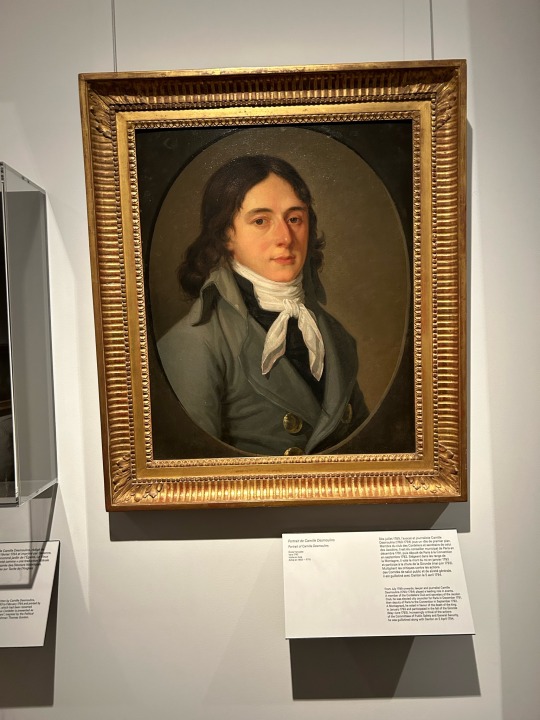


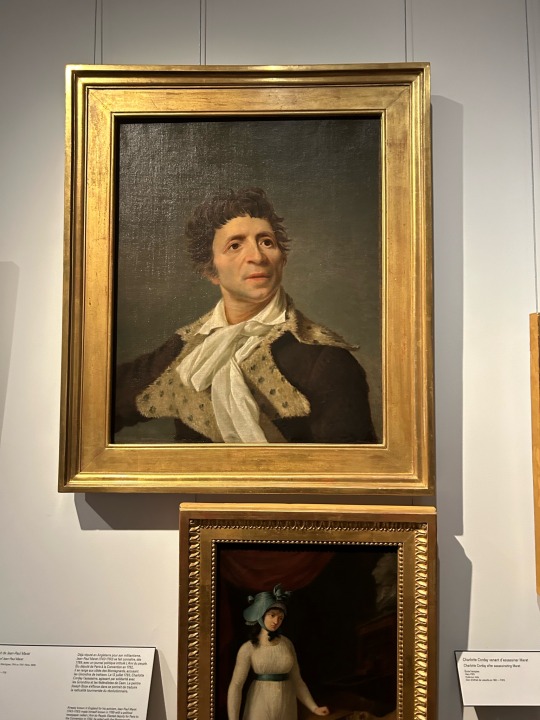

two years after the peak of my frev obssssion, i have finally made the pilgrimage to musée carnavalet!! the room with all of the revolutionaries portraits literally changed my life and brought me so many flashbacks
#lisa rambles#frev#french revolution#robespierre#danton#camille desmoulins#desmoulins#lucile desmoulins#marat#musee carnavalet
85 notes
·
View notes
Text
The difference in treatment between the Indulgents and the Cordeliers or Hébertistes
I have an opinion that will seem unpopular, no worries I am open to any criticism or to being corrected in the event of an error so do not hesitate to correct me. I have much more sympathy for the Hébertist faction, the exaggerators or the Cordeliers than that of Danton's Indulgents. Indeed if we exclude the Hebert case who is an indefensible man, mediocre in my eyes (I don't think I need to explain why) this is not the case for so many others. I mean Ronsin was a competent and honest administrator.
Despite his mysoginism (horribly reprehensible, just look at the speech he gave concerning the execution of Gouges and Manon Roland) Chaumette could be as competent as procureur syndicale de Paris and had also generous ideas (such as banning whipping in schools, equalization of funeral rites for all, protective measures for the elderly and hospitalized).
One of the most impressive cases is Momoro. Even the historian Mathiez, who nevertheless has little sympathy for the revolutionaries who were against the Committee of Public Safety in the spring of 1794, had practically nothing but praise for Momoro. He voluntarily lived in poverty and when he was tried he said he had given everything for the revolution. It was true in my eyes.
Of course I understand in a certain way the repression exercised by the Committee of Public Safety (more precisely the Convention since an arrest cannot be made without its agreement, it is not a dictatorship either) when Cordeliers wanted to launch a new insurrection against the Convention ( like Momoro for example). The fact of wanting to persecute the priests did not help, not to mention the fact that they wanted stronger repression of the enemies at the risk of making the Revolution even harsher. But when we analyze, I can understand where come frome their anger. Their hatred about religion was due to the fact that not long ago, a lot of religious fanatics infantilized the people, constantly made prohibitions against them (we must NEVER accept infantilization or loss of free will for religious reasons) and atrocious repressions without counting the their wealth that they monopolized (in terms of absurd repression there is nothing but to see the Calas affair, or that of the case of Chevalier de la Barre etc…), even if there were a lot of priest and believers weren't like that . Although the Cordeliers were wrong to respond to religious intolerance by intolerance, I can agree. The same goes for the Terror. At that time France was threatened by enemies from within and without and quite a few of their enemies carried out atrocious tortures (although rotten people like Fouché, Carrier, were not to be outdone in atrocities to the point that the Committee of Public Safety recalled them immediately). Prices were increasing because of the war, so without excusing them once again I can understand their minds when they demanded ever greater repression of the Terror (even if once again it was a serious error ,a mistake and even a fault).
Let's compare to the indulgent (or Dantonists) who are caught up in financial scandals (according to for a lot of historians like Jean Marc Schiappa). Danton moved only because of the financial scandals which were beginning to erupt and did not dare to attack head-on in this period of factional clashes, he let his friends do so. Moreover, according to certain historians like Decaux if I am not mistaken, he only came back against the Hebertists because they attacked them (and they did not only have them as enemies). He is not a clean character. Let's not talk about Fabre d'Eglantine. For Desmoulins I have an unpopular opinion of him. I find him very overrated and no matter how much I tried to appreciate his historical figure (by reading the very good biography of Leuwers or the book by Joseph Andras) I cannot. I don't think that despite the fact that he is very cultured, a man who rightly think that women must have the right of vote and even a republican before his time, he is not capable of assuming an important position unlike Saint Just or Ronsin who he made fun of. And worst of all I find him hypocritical, he who demanded clemency applauded the execution of the Hebertists following a parody of justice (yes I like the Montagnards of this period but this kind of thing should never be tolerated) . He didn't say anything when the wives of Momoro and Hebert were arrested which was very serious (afterwards I don't know well if they were arrested at the same time as Lucile Desmoulins), but he didn't realize that it was going well back in his face.
The Dantonists were irresponsible in my eyes. I completely agree that it was necessary to examine each prisoner on a case-by-case basis because there were surely a large number who had nothing to do there by creating as many commissions as possible as quickly as possible and getting down to business. job right away because prison is a horrible place, even more so for innocent people. But releasing everyone without distinction immediately would have been dangerous because there were also dangerous counter-revolutionaries or spies. I mean have they forgotten that the fall of Toulon to the English was due to betrayal? The betrayal of Dumouriez, the assassinations of some deputies, etc…
Where did this idea of making peace with foreign armies still occupying France come from when the French army was beginning to be victorious? Opposing a war of conquest I completely agree, but allowing one's own territory to be annexed is something else.
And how dangerous would it be to leave corrupt people like Danton in power. Sooner or later, he could perhaps have given in to blackmail in view of the evidence of corruption that contemporaries have today, which would have been very dangerous for France.
As a result, I never understood why the “good” indulgent ones were portrayed against the “bad” Cordeliers and Hébertists.
Whatever happens for all these factions, no matter my great admiration for revolutionaries like Le Bas, Saint Just, Couthon, the fact that I am sorry like many people that Robespierre is demonized, the fact that they allowed a parody of justice against these factions is an unforgivable fault and to have allowed the execution of Marie Françoise Goupil and Lucile Desmoulins among others to consolidate this parody of justice is unacceptable. Even if I understand their states of mind because they could not afford to lose especially in this period against these different factions and contrary to what the Thermidorians put forward, the majority of the Convention was just as guilty as them, there is no excuse for this kind of behavior.
Did Saint Just realize this when he said that the Revolution was frozen (even he spoke more about the consequences of this repression and that the revolution is weakened on this point) ? It would later fall on them and Elisabeth Le Bas was threatened with being guillotined for having been Le Bas' wife (some wanted to force her into a marriage with one of the Termidorians). If they had not allowed the fate of Goupil or Lucile Desmoulins earlier perhaps it would have been more difficult for the Thermidorians to threaten her.
For more information in the form of a movie , I invite you to see" Saint Just ou la Force des Choses" and " la Camera explore le temps Danton, la terreur et la vertue" in English sub. These are good movies about this period.
And you what do you think ?
#french revolution#Terror#georges danton#Camille Desmoulins#Ronsin#Momoro#Cordeliers#Indulgents#History#saint just#couthon#robespierre#lucile desmoulins#Hebert#Chaumette#joseph fouché#Carrier
49 notes
·
View notes
Text
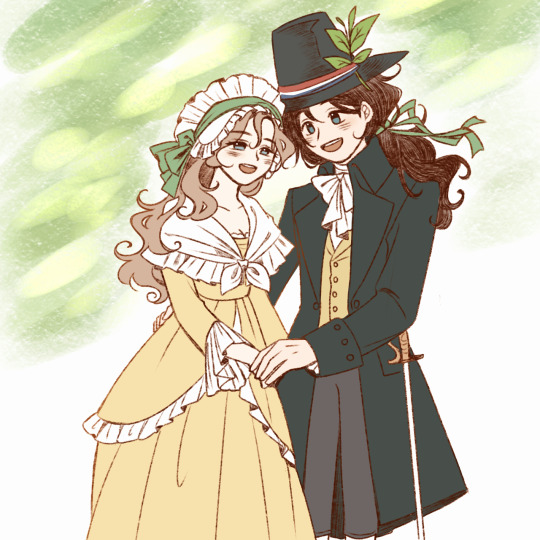
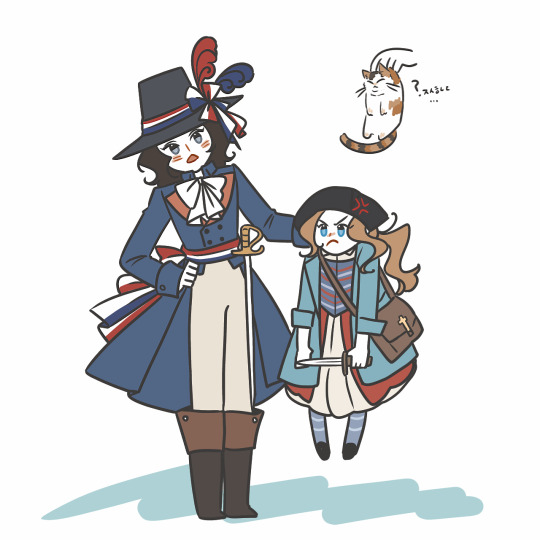
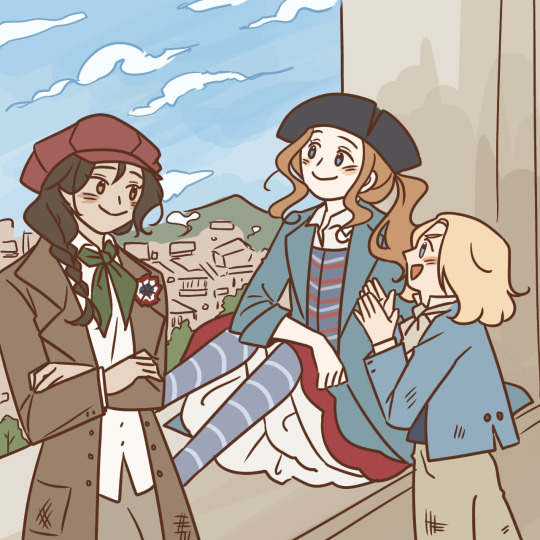
• CROSSOVER •
Les mis × Frev × 1789 les amants de la bastille
#les mis#les miserables#french revolution#1789 les amants de la bastille#camille desmoulins#lucile desmoulins#1789 les amants de la bastille charlotte#eponine#gavroche#barricade boys#louis antoine de saint just
87 notes
·
View notes
Text
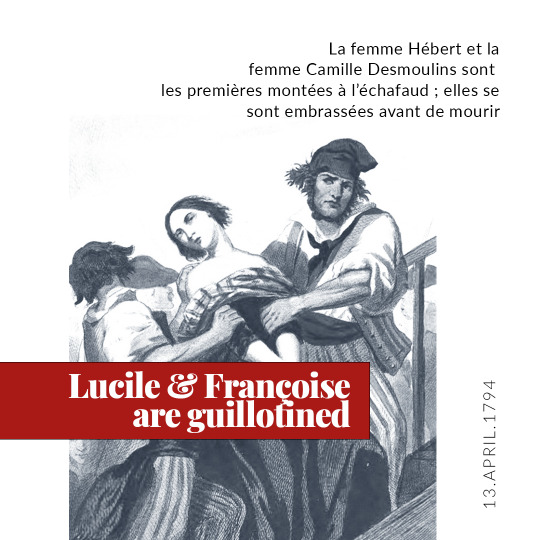
On the 13th of April 1794, exactly 230 years ago, Lucile Desmoulins and Francoise Hebert met their tragic end, following their husbands to the guillotine after enduring a brief, sham trial that wrongfully convicted them of conspiracy. Though widowed by leaders of ideologically opposed factions (Hebert was an extremist, while Desmoulins was a so-called indulgent), the two women forged a strong bond in prison. Their final moments were marked by a brief embrace before they faced their execution with dignity.
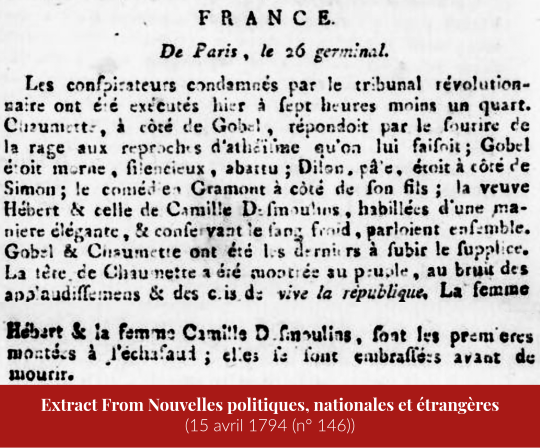
The execution of Lucile Desmoulins:
FRANCE.
From Paris, the 26th of Germinal.
The conspirators condemned by the revolutionary tribunal were executed yesterday at a quarter to seven. Chaumette, next to Gobel, responded to the accusations of atheism made against him with a rageful smile; Gobel was morose, silent, dejected; Dillon, cheerful, was beside Simon; the Count of Grammont next to his son; the widow Hébert and that of Camille Desmoulins, dressed elegantly and maintaining their composure, were talking together. Gobel & Chaumette were the last to endure the punishment. Chaumette's head was carried to the people amidst applause and cries of "Long live the republic." The wife of Hébert and the wife of Camille Desmoulins were the first to go up to the scaffold; they embraced before dying.
22 notes
·
View notes
Text
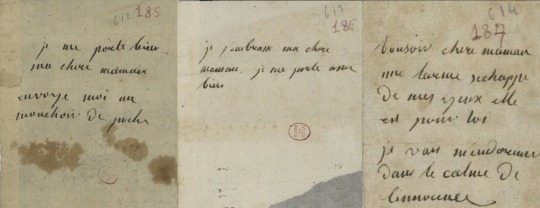
I’m doing fine my dear maman. Send me a pocket handkerchief.
I embrace you my dear maman. I’m doing pretty well.
Good evening dear maman. A tear falls from my eyes. It is for you. I’m going to fall asleep in the tranquility of innocence.
Three notes written by Lucile Desmoulins to her mother between her arrest on April 4 1794 and execution nine days later. The last one is generally seen as a final farewell, penned down right after the death sentence had been pronounced on April 13.
106 notes
·
View notes
Text
Anniversary of Lucile Desmoulins Death

Rest in Peace 💐
19 notes
·
View notes
Text
Przybyszewska's The Danton Case Official Drinking Game
Take a sip of a wine from Marseille* every time...
(*maybe water it down or substitute it with grape juice if you don't want to be like Danton in the play)
Someone starts humming La Marseillaise out of the blue
Danton gets called ugly (warning: maybe do it every other time, this happens quite a lot)
A character dramatically takes out their pocket watch
Robespierre's eye colour gets mentioned (yes, being called a "green-eyed monster" counts too)
A character either: a) talks about getting on their knees for someone, you know, metaphorically b) literally gets on their knees (looking at you, Eléonore)
Someone calls Camille a 'genius baby/toddler'
Lucile says or does something that proves she's smarter than 99 % of the characters
Robespierre gets called the Incorruptible
Saint-Just's being dte in the committee meetings (=down to execute)
You feel the strong urge to yell at Camille and call him a beautiful idiot (also approach with caution - this may be subjective but I personally felt like doing it in literally every scene he's in)
#french revolution#frev#feel free to add “if there's homoerotic tension” but know you're going to end up under the table before you get half-way through the play#don't take this too seriously#i really want to do a more serious analysis soon#I've already made bullet points and everything#frev shitposting#maximilien robespierre#camille desmoulins#stanisława przybyszewska#saint just#french revolution memes#history shitposting#the danton case#Przybyszewska#lucile desmoulins#georges danton#la revolution francaise#drinking game#frev tumblr#literature#french history
25 notes
·
View notes
Text

Doing these sketches just to get a better idea of their faces haha
#saint just#antoine saint just#frev#french revolution#robespierre#frev art#maximilien robespierre#camille desmoulins#lucile desmoulins#my art
82 notes
·
View notes
Text
Republican calendar! 4/12




#my art#french revolution#frev#history#art#robespierre#saint just#lucile desmoulins#camille desmoulins
162 notes
·
View notes
Photo

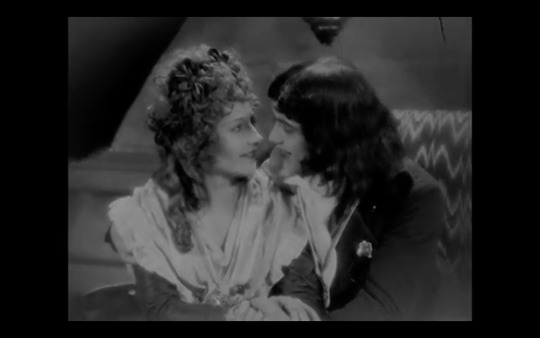
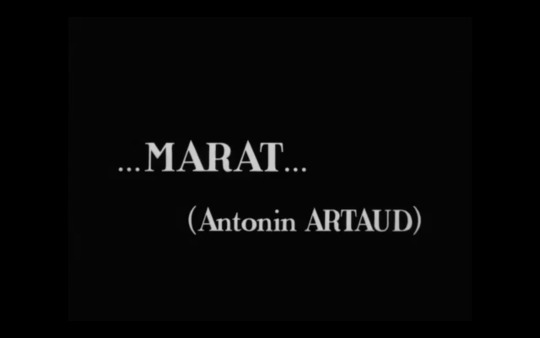


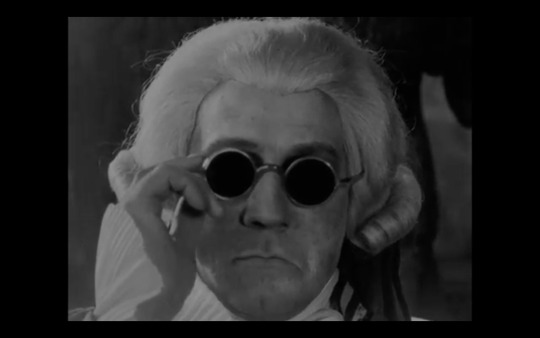
Napoléon (1927) réalisé par Abel Gance
#Napoléon#Napoléon vu par Abel Gance#Robert Vidalin#camille desmoulins#Francine Mussey#lucile desmoulins#Antonin Artaud#jean-paul marat#Edmond Van Daële#maximilien robespierre#Abel Gance#all characters should be introduced like this still today
191 notes
·
View notes
Text
I read the description of August 10th in Lucile's handwritten manuscript in the BHVP archives.
Here is description of the Dantons' house:
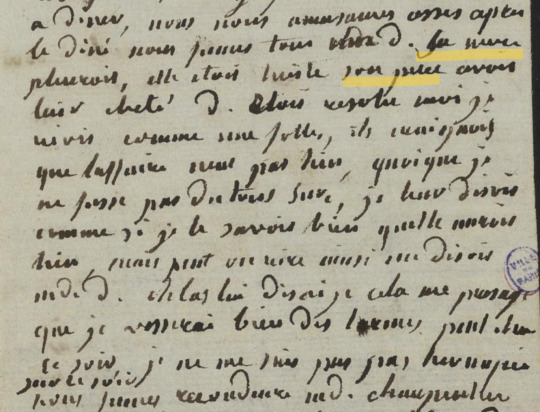
It seems to say "[…] nous fumes tous chez D [Danton]. Sa mère pleurait, elle était triste, son père avoit l'air ebeté[…] (= We were at Danton's house. His mother was crying and sad. His father was dazed[…])". This "Sa mère" could be Danton's mother or Gabrielle's mother (if the former, it seems odd that she would come all the way from Arcis to dangerous Paris), not Gabrielle. The next sentence is hard to read, but I still think the subject is "son père" (= maybe Georges or Gabrielle's father), not "son petit".
I also read the description afterwards and was able to confirm that it was Madame Robert (=Louise Kéralio) who fainted and was taken care of by Lucile, not Gabrielle.
History books (and the novels based on them) are clearly wrong in stating that it was Gabrielle who cried and fainted. Where did the error occur? Some biographers (and novelists) often use this (erroneous) description to explain her character, claiming that Gabrielle was a weak and unhappy lady, as Lucile writes, so she died in 1793. But if these are all statements about others, then there is no evidence at all for this description. (Besides, both her mother (or her mother-in-law) and Kéralio, who actually cried or fainted, survived the Revolution and did not die prematurely.)
I also found two manuscripts of the same content in the archives, one in small bold type as shown above, and the other in a more legible manuscript that appears to be a clean copy. As far as I can tell from Philippe Lejeune's transcription, the former is probably the original version of Lucile's diary. (Unless I'm missing something, however, Lejeune makes no mention of the latter).

Was it Lucile herself who did the cleaning up? Or someone else? For what purpose was it made?
13 notes
·
View notes
